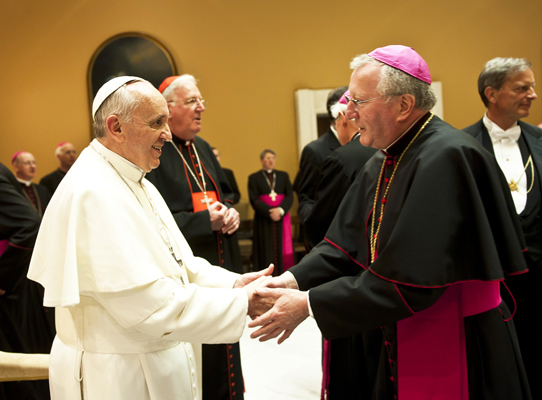The Diocese of Middlesbrough and the Diocese of Lancaster have announced their commitment to divest from fossil fuels, becoming the first Catholic dioceses in England and Wales to do so.
Their announcements are made together with two Catholic religious orders – the English Provinces of the Congregation of Jesus and the Presentation Sisters – alongside nine other local churches and Christian institutions in the UK.
They join more than 160 other Catholic institutions around the world that have already committed to divest from fossil fuels. Faith institutions constitute the greatest number of organisations contributing to the global “fossil-free” movement – which now stands at a total of over $12 trillion of assets divested globally.
Bishop Terry said: “With growing awareness of people’s concerns for the care of our common home, supported by the trustees and Council of Priests of the diocese, and after thorough scrutiny of diocesan investments and with support from Operation Noah, the Diocese of Middlesbrough has decided that now is the time to divest from fossil fuels. The evidence and the urgency of the climate crisis are all around us. However, as Pope Francis points out very clearly in his Encyclical Letter on The Care of Our Common Home, Laudato Si’, nothing will succeed if we do not begin with personal conversion, a change in lifestyle, a change of mindset.”
James Buchanan, Bright Now campaign manager for Operation Noah, said: “We are delighted that the dioceses of Middlesbrough and Lancaster have decided to divest from fossil fuels, as well as two more Catholic religious orders. We hope many other Catholic institutions will join them in taking this prophetic step out of love for God’s creation and those most affected by the climate crisis – above all those living in the world’s poorest communities.”
The announcement was made on the feast of the Epiphany and at the start of a key year for climate action globally, and particularly in the UK, with the COP26 conference to be held in Glasgow in November.
In September 2018, UN Secretary-General António Guterres said: “Climate change is the defining issue of our time – and we are at a defining moment. We face a direct existential threat… If we do not change course by 2020, we risk missing the point where we can avoid runaway climate change, with disastrous consequences for people and all the natural systems that sustain us.”
In his pontifical message to government negotiators meeting in Madrid at COP25 last month, Pope Francis similarly declared that the climate emergency is a “challenge to civilisation” needing “a clear, far-sighted and strong political will, set on pursuing a new course that aims at refocusing financial and economic investments toward those areas that truly safeguard the conditions of a life worthy of humanity on a healthy planet for today and tomorrow.”
The outgoing governor of the Bank of England, Mark Carney, says that although cuts to investment in oil and gas companies are beginning to take place in the financial sector, the process is not moving fast enough. Mr Carney made clear that all companies and financial institutions must consider their justification for continued investment in fossil fuels, warning of the increasing risk of ‘worthless’ assets in the sector.
Operation Noah is a Christian charity working with the Church to inspire action on the climate crisis.

